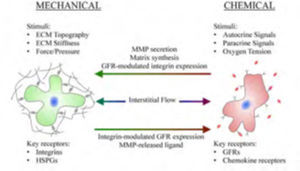Zaid Rahman
Research Description
Investigating Cancer cell migration in a microfluidic chip
Cancer cell migration is a series of fundamental, multistage succession of physicochemical events that results in the transformation of a locally growing tumour to disseminate individual tumour cells to distant sites within the human body. This complex mechanism that develops into a secondary tumour, ultimately reduces the survival of patients, hence coining the term metastasis, as a major life threatening disease. It is essential to elucidate the physical response of cancer cells, such as the change in morphology, near-yielding dynamics and cell motility in an artificial tumour microenvironment using microfluidics platform as an investigation tool. By focusing on events that takes place as deform-ability of both the environment and cells, we would be performing an all-inclusive study to investigate the key factors responsible for metastatic events.

Polachek et al. 2012
Student project (Msc./BSc.)
Based on the interests and expertise of the students, I often have sub-projects that are focused to study one particular aspect or change in parameters. For microfluidics, I am currently running projects where I would like to investigate the effect of interstitial flow rate on the change in morphology and migration characteristics of cancer cells. Moreover, I am also developing a microfluidic platform that would be able to better mimic the 3D tumour environment by using natural hydrogel material for tissue engineering. There are projects that can also be tailored to fit for modeling and design of the microfluidic based devices to develop novel tumour-on-a-chip platform studies.
Education
· MSc., Nanotechnology, University of Twente, 2019
· BTech., Nanotechnology, Amity University, 2016
About me
Born and raised in New Delhi, India. I finished by Bachelor of Technology from Amity University with a first division with distinction. My interest in the field of Nanotechnology and Nanoscience motivated me to pursue Master’s at the University of Twente, Netherlands. I was offered full scholarship to pursue my studies here, where I worked on cleanroom projects; Photolithography, Wet and dry etching, E-beam lithography for fabrication of nano-transistors. Later, I invested my interest in the field of microfluidics and did my master thesis on droplet generation for single-cell encapsulation targeted towards tissue regeneration. Currently, I am doing my PhD in investigating cancer cell migration using a microfluidic chip, under the supervision of Dr. Pouyan E. Boukany.

Z. Rahman
PhD candidate
- +31 (0)15 2786678
- Z.Rahman@tudelft.nl
-
Building 58, E2.320
Van der Maasweg 9
2628 HZ DELFT
The Netherlands